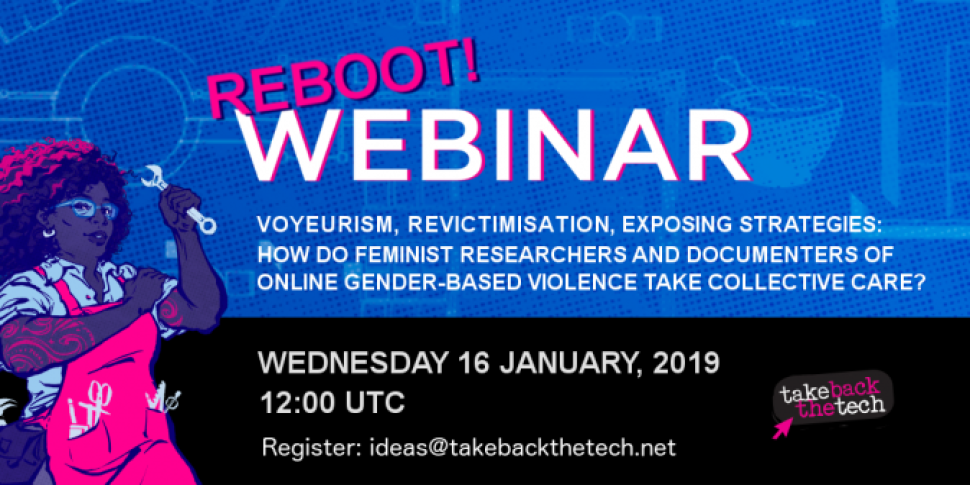
As we embark on a new year of #metoo and other forms of powerful testimonial movements such as #survivingRKelly, the wisdom shared in January’s Take Back the Tech! webinar was an important learning opportunity and reminder of how we can contribute to collective wellbeing and care in our movement.
Take Back the Tech! kicked off the New Year with a Reboot Webinar on documentation and reporting for researchers, journalists and feminist thinkers. Fundamental questions such as how researchers and documenters of online gender-based violence (GBV) take collective care were posed to four expert women from across the globe. These experts, Indira Cornelio from #SeguridadDigital ("#DigitalSecurity") in Mexico City, Tess Wandia from IHub in Kenya, Namita Aavriti from the Association for Progressive Communications’ Feminist Internet Research Network and Varyanne Sika from the Coalition for African Lesbians (CAL), all work with women who have faced tech-related violence. They shared how they embody and embed self-care in their work and movement.
It was unanimously agreed that feminist research and studies should be held to a higher standard regarding wellbeing and should be distinctly different from traditional research and studies. There should be clear intentions to not cause any further harm and the sole purpose of research cannot just be focused on testing hypotheses and leaving the participant. There must be careful and continued consideration of the wellbeing of participants; in other words, research and documentation should be predicated on the self-care of everyone involved. Self-care is of course about individuals setting boundaries and protecting themselves. Varyanne shared an insightful comparison. Most jobs require protective clothing for their work to protect them from harm; researchers, particularly when working in trauma or triggering situations like online GBV, also need protective clothing. I completely agree and think this should be part of the duty of care employers, donors, universities, organisations and commissioners. Safeguarding policies should include self-care and “protective clothing”.
All four experts agreed that from the very outset of a project centred around trauma, it should be anticipated that this work will be opening up wounds for survivors. These may be wounds that survivors do not realise have not yet healed or been addressed. Collective self-care is about ensuring our actions do not cause others harm. Step one is putting self-care into practice for those you’re working with and embedding this as your organisation’s or project’s culture or way of working. This includes how references are made in research, anonymity, questions you ask and how you ask them in interviews, dissemination of findings, as well as understanding that consent is not static and can be withdrawn at any time.
During the webinar, Tess reminded us that once you publish documentation of online violence on the internet, whether it’s a piece of research or a clip of an interview, it will remain on the internet forever, and survivors you’re working with will be labelled as the person who underwent this type of online abuse. It is therefore very important to manage expectations and provide as much explanation as possible about what could happen when the information is published.
Read the full article here.